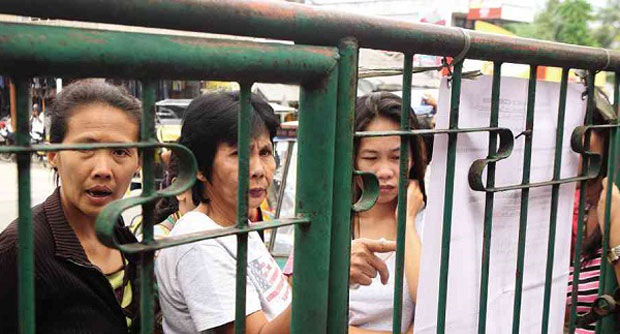More mergers in rural banking sector seen

Depositors are greeted by an iron grill gate and a notice announcing the closure of Rural Bank of San Fernando in San Fernando town, Cebu province. The Bangko Sentral ng Pilipinas expects more mergers in the rural banking sector as industry players take advantage of regulatory incentives, allowing them to time their moves to gain greater economies of scale. TONEE DESPOJO/CEBU DAILY NEWS
MANILA, Philippines—The Bangko Sentral ng Pilipinas (BSP) expects more mergers in the rural banking sector as industry players take advantage of regulatory incentives, allowing them to time their moves to gain greater economies of scale.
“There are a lot of deals cooking in the pipeline. Cooperative banks are consolidating, rural banks are being taken over,” BSP Deputy Governor Nestor A. Espenilla Jr. said late Friday.
Regulators openly encourage the merger of rural and cooperative banks to strengthen the sector that serves the Philippine countryside.
Rural and cooperative banks’ combined branch network accounts for 26.6 percent of the banking system’s physical reach.
But these small lenders are underrepresented as they account for less than 3 percent of the banking industry in terms of resources and assets.
These small lenders also have the worst asset quality in the industry. As of June last year, rural banks had a nonperforming loan ratio of 12.36 percent, while cooperative banks had an even higher level of bad loans at 12.38 percent.
Soured loans held by universal and commercial banks, which cornered about 90 percent of the banking sector in terms of assets, stood at just 2.68 percent of their total loans in the same period.
According to Espenilla, several rural and cooperative banks have applied for regulatory approval to merge this year, taking advantage of the perks offered by the central bank under the Strengthening Program for Rural Banks-Plus (SPRB).
The SPRB-Plus package is an enhanced version of the original SPRB that was introduced in 2010.
Under the current program, which ends this year, merging rural banks are eligible for various perks ranging from more liberalized requirements for putting up new branches, and assistance loans from the Philippine Deposit Insurance Corp. (PDIC).
“The challenge for small banks is, they need to have scale. If your business isn’t big enough, you can’t even afford to hire good managers,” Espenilla said. “What happens is you become the analog of a sari-sari store.”
Larger rural banks tend to maintain more efficient operations, allowing them to serve their markets better, he explained.
The push for consolidation in the rural and cooperative banking sectors came just as some of the industry’s most reputable players were served notices of closure.
Last month, the Rural Bank of Montevista in Compostela Valley was forced into receivership after it suffered massive losses as a result of typhoons’ “Pablo” in 2012 and “Yolanda” late last year.
Prior to its closure, the bank was repeatedly cited by the Rural Bankers Association of the Philippines for extending loans that helped lift the lives of many small entrepreneurs in Mindanao.
The association recognizes deserving banks under the Microenterprise Access to Banking Services (MABS) project, a program funded by the US Agency for International Development.
Last week, the nearly 60-year-old Gulf Bank (formerly the Rural Bank of Lingayen) also went bankrupt.
The bank was previously recognized by Land Bank of the Philippines as one of the best rural banks in the country for several years until 2010.
